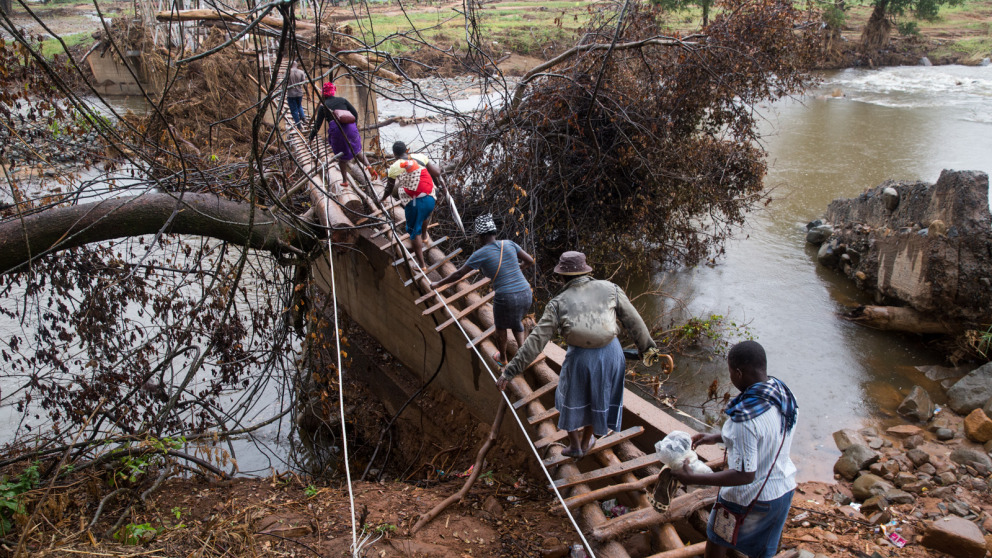Most Affected, Least Heard
29.04.2019
It seems reasonable to expect that the people who suffer most from the impacts of climate change are represented in the international climate negotiations. Patrick Toussaint, a researcher at the Institute for Advanced Sustainability Studies (IASS), has analysed the status quo from the perspective of international law. He concludes that those who currently bear the brunt of climate change – or will do so in the foreseeable future – have little or no influence on the negotiations.

The efforts the international community has already made to tackle climate change are far from adequate to protect those who are particularly vulnerable to its effects. After more than 25 years of negotiations under the United Nations Framework Convention on Climate Change (UNFCCC), this remains an unresolved issue. In the context of those negotiations, “loss and damage” is the term used to describe the negative impacts of climate change and their repercussions for people and the environment.
It is above all poor and marginalized communities that will suffer the consequences of climate change. The same goes for people who live in exposed geographic regions. While most of these people are based in developing countries, poor and marginalised communities in industrialized nations are also affected. Their perspectives need to be included in the international climate negotiations, because the decisions made there have a direct impact on their lives and livelihoods. “Yet the current opportunities for participation under the UNFCCC are far from sufficient to give them an effective voice,” says Patrick Toussaint, whose study “Voices unheard – affected communities and the climate negotiations on loss and damage” has just been published in the peer-reviewed journal Third World Thematics.
Climate conference observers with limited influence
“Observer status” offers one form of participation under the UNFCCC, but to gain it, an organisation has to overcome several bureaucratic hurdles, including an accreditation procedure that takes over a year. Alternatively, affected people can apply for accreditation as delegates of existing observer organisations. Even then, participation in the conferences incurs costs that vulnerable communities cannot afford to pay. “While observers are generally free to communicate directly with Parties, the Secretariat, and other stakeholders,” notes Toussaint, “their ability to set the agenda and participate in the actual decision-making is severely constrained.”
The sheer number of observers is another factor that impedes effective engagement. For example, at the last ten UN Climate Change Conferences, the number of observers ranged between 3,600 and 13,400. And even when observer status has been granted, in some cases observers are excluded from sessions on important agenda items. Toussaint’s study also shows that initiatives to reform stakeholder participation in the UN Climate Change Conferences have yet to yield tangible results. One reason for this is the sovereignty of states in international negotiation processes, that hold a monopoly over decision-making powers. The assumption then is that affected communities are already adequately represented by delegates from their respective countries and observer organisations – first and foremost NGOs – and therefore do not need to represent themselves.
Traditionally, loss and damage has been seen as a problem that mainly affects developing countries, because the issue has tended to be highlighted by small island states and other vulnerable countries with the support of civil society. This has contributed to entrenchment on the issue that has often stalled negotiations at UN Climate Change Conferences.
In his study, Toussaint points out that a broader understanding of loss and damage as a global problem that affects poor and marginalised communities in both developing and developed countries could help to break down barriers in this polarised debate. “This could increase the prospects of loss and damage being addressed with similar urgency on the political agendas of industrialised countries,” argues Toussaint.
Cyclone Idai - what the devastating storm has done in Zimbabwe
Affected persons’ organisations
In the special issue in which Toussaint’s article appears, the political scientists Annette Schramm and Jan Sändig from the University of Tübingen outline a model of representation for affected persons’ organisations (APO model). They define affected persons’ organisations as coalitions of people that represent themselves and their kind in global processes. Examples include alliances of persons with disabilities that advocate for the rights of disabled people, or La Via Campesina, a coalition of smallholder organisations that represent the interests of small farmers at international level.
In the context of the climate negotiations, representatives of indigenous peoples and delegates from small island states could count as affected persons’ organisations. Beyond that, such alliances do not enjoy special status under the UNFCCC. The direct involvement of affected persons’ organisations in the climate context would give affected communities the opportunity to directly voice their concerns at UN Climate Change Conferences, report first-hand their experiences of suffering and dealing with loss and damage, and formulate demands. In the long term, the APO model could thus usher in a paradigm shift: From the perception of loss and damage as a third-world problem to the recognition that it is a global issue. This will hopefully pave the way for more ambitious political measures, in particular the support and financing of affected communities.
Publication:
Patrick Toussaint: Voices unheard – affected communities and the climate negotiations on loss and damage, Third World Thematics, 04/2019. DOI: 10.1080/23802014.2018.1597640 (https://doi.org/10.1080/23802014.2018.1597640)





